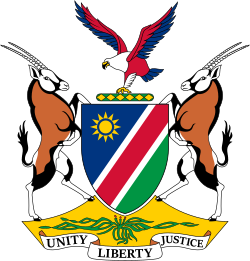| President of the Republic of Namibia | |
|---|---|
 Seal of the Presidency | |
 Presidential standard | |
| Style | Her Excellency |
| Type | |
| Residence | State House of Namibia |
| Seat | Windhoek |
| Term length | Five years, renewable once |
| Constituting instrument | Constitution of Namibia |
| Inaugural holder | Sam Nujoma |
| Formation | 21 March 1990 |
| Deputy | Vice President of Namibia |
| Salary | N$ 1,753,964 (US$ 96,000) annually [1] |
| Website | www.op.gov.na |
 |
|---|
The president of Namibia is the head of state and head of government of Namibia. The president directs the executive branch of the government, acts as chair of the Cabinet and is the commander-in-chief of the armed forces in terms of the Constitution.






